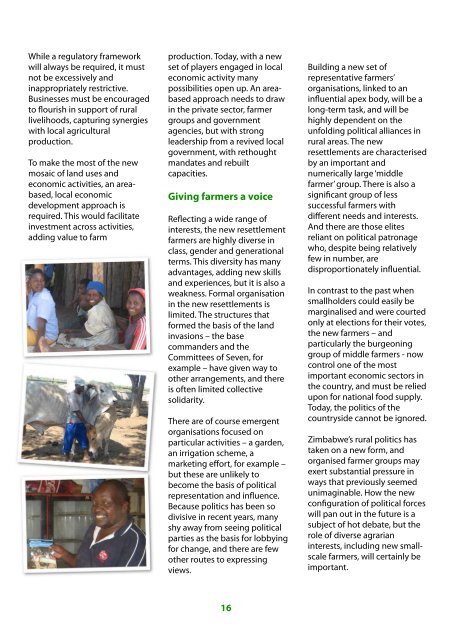Zimbabwe's Land Reform
Zimbabwe's Land Reform
Zimbabwe's Land Reform
Create successful ePaper yourself
Turn your PDF publications into a flip-book with our unique Google optimized e-Paper software.
While a regulatory framework<br />
will always be required, it must<br />
not be excessively and<br />
inappropriately restrictive.<br />
Businesses must be encouraged<br />
to flourish in support of rural<br />
livelihoods, capturing synergies<br />
with local agricultural<br />
production.<br />
To make the most of the new<br />
mosaic of land uses and<br />
economic activities, an areabased,<br />
local economic<br />
development approach is<br />
required. This would facilitate<br />
investment across activities,<br />
adding value to farm<br />
production. Today, with a new<br />
set of players engaged in local<br />
economic activity many<br />
possibilities open up. An areabased<br />
approach needs to draw<br />
in the private sector, farmer<br />
groups and government<br />
agencies, but with strong<br />
leadership from a revived local<br />
government, with rethought<br />
mandates and rebuilt<br />
capacities.<br />
Giving farmers a voice<br />
Reflecting a wide range of<br />
interests, the new resettlement<br />
farmers are highly diverse in<br />
class, gender and generational<br />
terms. This diversity has many<br />
advantages, adding new skills<br />
and experiences, but it is also a<br />
weakness. Formal organisation<br />
in the new resettlements is<br />
limited. The structures that<br />
formed the basis of the land<br />
invasions – the base<br />
commanders and the<br />
Committees of Seven, for<br />
example – have given way to<br />
other arrangements, and there<br />
is often limited collective<br />
solidarity.<br />
There are of course emergent<br />
organisations focused on<br />
particular activities – a garden,<br />
an irrigation scheme, a<br />
marketing effort, for example –<br />
but these are unlikely to<br />
become the basis of political<br />
representation and influence.<br />
Because politics has been so<br />
divisive in recent years, many<br />
shy away from seeing political<br />
parties as the basis for lobbying<br />
for change, and there are few<br />
other routes to expressing<br />
views.<br />
Building a new set of<br />
representative farmers’<br />
organisations, linked to an<br />
influential apex body, will be a<br />
long-term task, and will be<br />
highly dependent on the<br />
unfolding political alliances in<br />
rural areas. The new<br />
resettlements are characterised<br />
by an important and<br />
numerically large ‘middle<br />
farmer’ group. There is also a<br />
significant group of less<br />
successful farmers with<br />
different needs and interests.<br />
And there are those elites<br />
reliant on political patronage<br />
who, despite being relatively<br />
few in number, are<br />
disproportionately influential.<br />
In contrast to the past when<br />
smallholders could easily be<br />
marginalised and were courted<br />
only at elections for their votes,<br />
the new farmers – and<br />
particularly the burgeoning<br />
group of middle farmers - now<br />
control one of the most<br />
important economic sectors in<br />
the country, and must be relied<br />
upon for national food supply.<br />
Today, the politics of the<br />
countryside cannot be ignored.<br />
Zimbabwe’s rural politics has<br />
taken on a new form, and<br />
organised farmer groups may<br />
exert substantial pressure in<br />
ways that previously seemed<br />
unimaginable. How the new<br />
configuration of political forces<br />
will pan out in the future is a<br />
subject of hot debate, but the<br />
role of diverse agrarian<br />
interests, including new smallscale<br />
farmers, will certainly be<br />
important.<br />
16

















